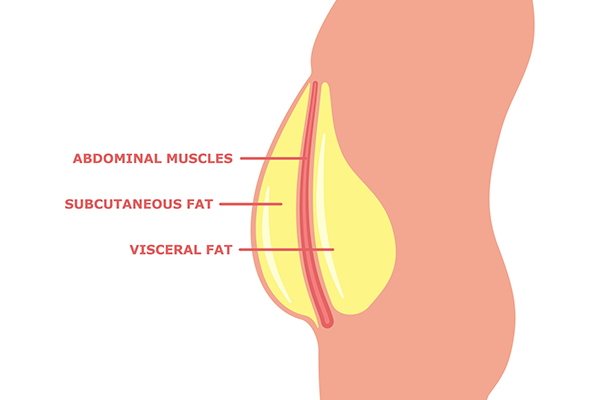5 Reasons Why You Might Be Losing Weight But Not Inches

Weight loss is a complex and tricky thing. You could be doing everything “right” but not see the changes you’re hoping for.
Sometimes people lose weight but not inches (and vice versa), which can leave anyone feeling frustrated and confused.
First, it’s important to recognize that weight loss, when done in a healthy, sustainable way, is quite slow. A normal, healthy rate of weight loss is half a pound to two pounds a week.
You may have weeks when you’re working hard and eating well, but the scale doesn’t budge. You may even see it fluctuate upwards (especially as you gain muscle) and then back down.
This is the point at which many people throw their hands up and give in.
But the thing is, it often takes three to four weeks, or even longer to really start to see and feel a difference, so if you want results, you need patience.
Also, stay away from fad diets, detoxes, and other quick fixes — that’s the quickest way to crash, burn and inevitably, gain the weight right back.
Let’s take a look at why you might be losing weight but not inches.
1. Water Weight

If you cut out carbs, which are stored with water in the body, you may notice a quick, but temporary weight loss.
This is usually water weight and not true weight loss, which is why your weight goes right back up to where it was as soon as you reintroduce carbs into your diet.
If you see the scale going down but you’re not seeing any other changes, it’s possible it’s just water weight.
2. Genetics

Registered Dietitian Nutritionist, Malina Malkani, MS, RDN, CDN, creator of the Wholitarian™ Lifestyle, says that, “when and where you lose inches during weight loss is individualized and is heavily influenced by your genes, whether or not you’re exercising, and if you are, what kind of exercise you do.”
Eating the right foods for your genetic profile might be able to help you optimize your results.
Malkani, who offers genetic nutrition testing to her clients shares, “two of my clients recently had great success using nutrigenomics testing to identify the types of exercise and protein to carbohydrate to fat ratios that helped them maximize results, both in weight loss and inches lost.”
Instead of “trial-and-erroring” their way through a weight loss process, nutrigenomics makes it possible for people to allow their DNA to uncover personalized diet and fitness recommendations.
3. Your Diet

If you are on a crash diet or fad diet, you may temporarily lose some weight (it could be water weight or even visceral fat), but this is not likely to affect inches.
You have to be in a consistent, steady caloric deficit for true weight loss to start happening.
To do this in a healthy way and sustainable way, you need a solid plan that decreases your calories by a little bit (anywhere from 250 to 500 calories per day) but not so much that you feel deprived, hungry or hangry.
This also means that your weight loss will be slow, so those inches will take a while (a few weeks, at the earliest, but probably longer) to start to decrease.
4. Type of Body Fat

Not all body fat is created equal. There are two main types that we carry with us — subcutaneous and visceral.
Subcutaneous
This is the layer of fat that is just beneath the skin, so it’s the most visible.
We need a certain amount of subcutaneous fat to be healthy, make hormones, and insulate our body properly.
It’s also what you are measuring when you take measurements of your body.
Since subcutaneous fat is not the only fat you are losing (there’s also visceral fat plus some muscle, as well as water) you won’t see big changes in your measurements right away, even if the number on the scale is going down.
Visceral
This fat may be less visible but it’s more harmful than subcutaneous fat. Visceral fat is stored deep in the abdominal area.
It surrounds your internal organs and can negatively affect their function. It also can increase inflammation in the body, as well as raise your risk for heart disease.
The good news is that visceral fat will also decrease as you lose weight.
The bad news is that this is another reason you won’t see instant changes in the subcutaneous layer.
5. Fat Distribution

Fat distribution is a big part of why you may see weight loss but not inches loss in the first few weeks of your new routine.
When we begin to lose fat, it doesn’t just decrease in one area — fat all over the body begins to slowly melt away, so initially, even though you’re losing weight and fat, you may not see or feel much change.
The way our fat is distributed throughout the body is also influenced by things like gender, genetics, age, muscle mass, nutrition, and more.
Men for example, carry more fat around the abdominal area, while women carry more on their hips and thighs.
Tips to Lose Inches in a Healthy Way
- First, as discussed above, be gentle with yourself and have patience — weight loss isn’t a quick process but that’s okay — building new habits takes time.
- Make sure you have a plan in place for your workouts that is reasonable and sustainable.
- Nourish your body instead of depriving yourself. Sure, deprivation might work for a few weeks (if that) but taking good care of yourself and giving your body the nutrition it needs is what ultimately works in the long run.
